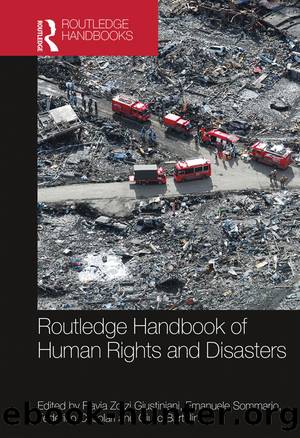Routledge Handbook of Human Rights and Disasters by unknow

Author:unknow
Language: eng
Format: epub
Tags: Nonfiction, Reference & Language, Law, International, Social & Cultural Studies, Political Science, International Relations, History, Military
ISBN: 9781351629997
Publisher: Taylor and Francis
Published: 2018-03-15T04:00:00+00:00
The human rights-based approach to non-discrimination: international disaster law making direct recourse to non-discrimination clauses elaborated under International Human Rights Law
Next to the humanitarian approach, clearly revealing how permeable IDL is to the core principles of IHL,20 it is possible to discern another approach, which as mentioned consists in relevant international-law instruments and provisions making direct reference to the principle of non-discrimination. This means that, on this approach, non-discrimination is not conceived as a derived principle contained in that of impartiality but enjoys a freestanding status. Unlike the humanitarian approach, this one is firmly rooted in International Human Rights Law (IHRL)âhence the idea of a human rights-based approach to disaster management.21
As is well known, different techniques have been developed under IHRL to promote equality and non-discrimination among individuals. The great majority of IHRL instruments, starting from that milestone instrument which is the Universal Declaration of Human Rights (UDHR),22 contain an accessory non-discrimination clause mentioning an open list of prohibited grounds on which there can be no discrimination in respecting the human rights protected by the instrument at stake.23 Sometimes the IHRL instruments also explicitly mention the principles of non-discrimination and equality in relation to specific individual rights.24 In other cases, freestanding non-discrimination clauses have also been formulated, some in the diplomatic practice,25 others through the practice of relevant monitoring bodies.26 Lastly, several issue-specific conventions have been developed for the purpose of eliminating discrimination on one particular groundâevidence that discrimination on that ground is especially reprehensible or that those who are discriminated against on that ground are particularly vulnerable.27 These treaties generally do not make explicit reference to disaster scenarios. The most significant exception is the Convention on the Rights of Persons with Disabilities, under which
States Parties shall take, in accordance with their obligations under international law, including international humanitarian law and international human rights law, all necessary measures to ensure the protection and safety of persons with disabilities in situations of risk, including situations of armed conflict, humanitarian emergencies and the occurrence of natural disasters.28
However, as is clearly demonstrated in different contributions to this volume,29 just because an instrument makes no explicit reference to any disaster scenario does not mean that such scenarios fall outside the scope of the instrument in question. On the contrary, it is very much the practice of human rights monitoring bodies to take a human rights-based approach to disaster management, and, most importantly for our purposes here, to clearly invoke the non-discrimination clauses enshrined in relevant treaties, stressing the need to protect the vulnerable members of society, as well as their full enjoyment or exercise of rights and freedoms, in either pre- or post-disaster settings.
Quite instructive, in this respect, is the practice of the Committee on Economic, Social and Cultural Rights (CESCR) established under the corresponding Covenant. In its General Comment on the right to the highest attainable standard of health, for instance, the CESCR has stated that
States parties have a joint and individual responsibility ⦠to cooperate in providing disaster relief ⦠Priority in
Download
This site does not store any files on its server. We only index and link to content provided by other sites. Please contact the content providers to delete copyright contents if any and email us, we'll remove relevant links or contents immediately.
Machine Learning at Scale with H2O by Gregory Keys | David Whiting(4292)
Killers of the Flower Moon by David Grann(4037)
Oathbringer (The Stormlight Archive, Book 3) by Brandon Sanderson(3143)
Will by Will Smith(2906)
Once Upon a Broken Heart by Stephanie Garber(2843)
Guns, Germs and Steel by Diamond Jared(2365)
It Starts With Us (It Ends with Us #2) by Colleen Hoover(2337)
Borders by unknow(2301)
Friends, Lovers, and the Big Terrible Thing by Matthew Perry(2218)
The Room Where It Happened by John Bolton;(2150)
The Color of Law by Richard Rothstein(1932)
A Short History of War by Jeremy Black(1842)
The Strength In Our Scars by Bianca Sparacino(1839)
HBR's 10 Must Reads 2022 by Harvard Business Review(1837)
A Game of Thrones (The Illustrated Edition) by George R. R. Martin(1711)
Water Rights and the Environment in the United States by John Burch(1673)
515945210 by Unknown(1660)
Examples & Explanations: Administrative Law by William F. Funk & Richard H. Seamon(1639)
That Every Man Be Armed by Stephen P. Halbrook(1576)
